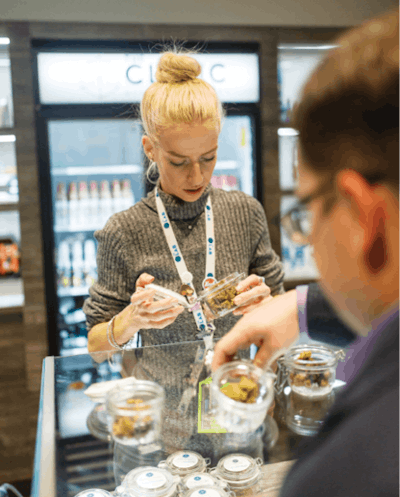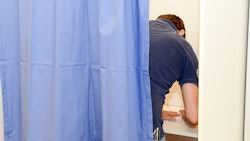
When the housing market crashed in 2008, many facets of the economy went belly up. Homeowners either had their dream homes ripped away from them or abandoned them, either way unable to continue making payments on a property worth less than its mortgage. Many local and national banks were either shut down or took huge losses. And construction companies, once a pillar of the American economy, went out of business in droves.
Ryan Cook, COO for The Clinic, owned a construction business in Denver during that time. A graduate of University of Colorado Boulder’s architecture school, he spent the better part of the 2000s designing and working on commercial and residential projects—first in Michigan, then in the Denver-metro area. When the housing market crash came for his business, he knew it was time to reimagine himself.
A friend of his, Max Cohen, had real estate in Denver and was being approached by hopeful cannabis business owners looking to start businesses on his properties. Reticent at first given the federally illegal status of marijuana, Cohen warmed up to the idea of becoming a cannabis-business owner after the federal government announced in the Justice Department’s famed 2009 “Cole Memo” that it would not be prosecuting state-legal medical cannabis businesses. He approached Cook about launching a business together.
“I think that was the kicker,” Cook says of the historic memo.
The duo, along with some of Cook’s UC Boulder friends, opened their first Clinic in Denver in November 2009. Eight years later, The Clinic has become one of the most recognized brands in the cannabis industry with seven locations in three states (two in Illinois, one in Nevada and four in Colorado)—and the company’s more than 50 awards ranging from business practices to cultivation have earned The Clinic a reputation for premium-quality cannabis.
More Awards, More Customers
Winning awards was never The Clinic’s goal, Cook says. That doesn’t mean the vertically integrated company has shied away from competing at events. From multiple High Times Cups to the more-recent Grow-Off, The Clinic’s cultivars have garnered multiple accolades every year since 2010. Carrying award-winning genetics has been a useful tool in attracting media attention and new customers.
“If you’re lucky enough to win one of those awards, for sure there [are] a lot of customers and patients that want to come in and see the product that you won with and have an opportunity to try it themselves,” Cook says.
More important than winning awards, according to Cook, is ensuring the patient and consumer receives the same quality product that is sent to competitions. No competition product is grown in a separate room or a grower’s home. Instead, the best examples are plucked from the same batches that are sold to The Clinic’s customers.
“We are a business, and a business runs by being able to generate revenue. We pull no punches about that. But I think responsible businesses can do not only that, but they can also, at the same time, create a really positive effect in the community in which they live.” Ryan Cook, COO, The Clinic
The Clinic offers a wide range of products to its medical patients and recreational consumers. The company’s “Strain Book” currently lists 40 cultivars available at its Colorado dispensaries throughout the year.
While popular genetics such as Gorilla Glue #4 (since renamed GG4) and Durban Poison are on the list, most are rarer or lesser-known genetics such as Fall 97 and Grape God Bud. Marketing these less-famous varieties in a new(ish) industry can be a challenge, Cook says, but The Clinic has tried to ensure its customers have all the information needed to make an informed purchase.
“We are a brick-and-mortar store, so if people have questions or problems, people know where to find us. They can come in to talk to someone, or we can put them in touch with our breeder or one of the other growers and work through [questions],” Cook says.
The Clinic’s award-winning reputation has also helped the company introduce new products to the market. Cook says different genetics can be successful in competitions “and provide a little bit of excitement for customers and patients, and get them to head into our doors and check things out.”

Brandon Waddle, The Clinic’s retail director of operations, says having rare genetics has gone a long way in creating a loyal customer base.
“There are a number of individuals that are very loyal to a certain strain,” he says. “If we don’t have that, or … we have that at one location, but not the others, then they will drive across town because they want to be able to get the Fall 97, and it’s only at the Highlands location.”
Evolving Designs
Customers walking into the chain’s flagship store located near Colorado Boulevard and I-25 can expect to be welcomed into a sleek and well-designed floor space filled with jars of flowers, display cases with slabs of concentrates and fridges for infused drinks and edibles. Windows were left un-bricked to let natural light flood the floor.
The finish is a professional-looking space where patients feel comfortable making their medical purchases and “not [like they are] doing something wrong,” as Cook puts it.
The patient’s comfort level is a focus whenever The Clinic designs a retail space, which is achieved by focusing on what Cook calls the “one-on-one experience.”
“If you are new, and you haven’t been in something like this before, then you can really learn,” Cook says. Privacy for medical patients is especially crucial as they sometimes want to communicate their health issues with the budtenders to get the right product recommendation. While The Clinic does not have private rooms, every store is designed with that one-on-one experience in mind where patients won’t be overheard. The medical side of the dispensaries are separate from the recreational side, granting more privacy for patients to discuss their needs with budtenders.
“I think it’s more of a calming experience for someone when they are making those types of purchases,” Cook continues.
While store layout for privacy and rotating product displays are important for any retail business, those are not the only things customers are looking at, Cook says.
“It’s important for us to provide [customers] a high-end retail experience … so they want to come back, and when they do, the space is different and changing,” Cook explains. “It keeps some level of excitement for the customer.”

An example of this can be seen with the company’s concentrates displays. When The Clinic first launched The Lab (its in-house extraction division) in 2010, the market for concentrates represented single-digit percentages of the company’s sales. As the concentrates market has evolved and taken on a larger portion of The Clinic’s business, so have the displays.
Not only do concentrates demand more prominent display space, but so do vaporization products. Today’s displays have evolved from showcasing concentrate products toward an emphasis on vaporization products.
“We have a feature display that we try to switch out every month and highlight a different vendor,” Waddle says. As part of his role, he works with vendors looking to have their products featured at the dispensaries. He says the company is very particular about the vendors with whom the company partners, focusing on developing partnerships with groups that have similar philosophies on quality, customer service and education.
Tending Bud
Customer education is one of the most important and challenging aspects of running a dispensary business. In few other industries do retailers need to explain and teach their customers so much about the products they are purchasing.
For Waddle, the key to customer education is having a good budtender staff. He says teaching new staff the importance of going out of their way to help people is a key factor in any cannabis business “because that’s really how you build a small business, is by building a loyal patient base or clientele.”
Education can be a double-edged sword: While newcomers will (hopefully) absorb the information budtenders offer, Colorado’s mature market also means that a segment of the client base can be more informed than your staff. Few things can hurt a dispensary’s reputation more than giving out bad information. However, industry knowledge isn’t The Clinic’s only hiring factor.
“It’s important for us to provide [customers] a high-end retail experience … so they want to come back, and when they do, the space is different and changing.” Ryan Cook, COO, The Clinic
Waddle’s background is in the restaurant business: He worked at Outback Steakhouse to help put himself through college and stayed with the company until becoming a budtender at The Clinic in 2010. His restaurant background has shaped his views on customer service: He looks for people skills more than industry knowledge in his new hires.
“We’re in the retail world, we’re in the public a lot, we interact with tons of people all the time,” he says. Some of his hires even come from positive customer service experiences he’s had.
“A lot of employees that I bring on I’ve either interacted with because … I might be out and about getting a cup of coffee at Starbucks or get great service one night at a restaurant and say, ‘Hey, I don’t know if you thought about working in the industry, but you’ve got a great attitude and seem to really be a good people person. If you’re interested, reach out, and we’ll see if we can get you a position.’”
Finding new staff can be a challenge in Denver’s current job market—the Mile High City has an all-time low unemployment rate of 2.1 percent according to data from the Bureau of Labor Statistics. Keeping staff is also a challenge in the cannabis industry as employees move from business to business or leave to open their own ventures.
Waddle knows that many of his new hires won’t stay with The Clinic forever, especially in entry-level positions such as budtenders and packaging clerks, but several have stayed on and moved up the company ranks. He says employees will stick with your company if you create “an environment [where employees] continue to grow, continue to learn, continue to be able to expand their knowledge and get opportunities to play a bigger role in what is happening.”
Marketing Matters
In addition to managing the day-to-day operations of the four Denver dispensaries, Waddle also has a say in The Clinic’s marketing decisions, including the company’s Daily Deals.
“We tried to make some of the bigger and better deals on days we were already a little bit slower” to drive more business, Waddle explains. For example, customers visiting The Clinic on Mondays receive 10 percent off all flower, seeds and clones; Wednesdays see concentrates on sale by 10 percent, and edibles are discounted on Sundays. On Fridays and Saturdays, typically the busiest days for any dispensary where customers don’t need as much of an incentive to visit the shop, capsulated products and merchandise go on sale by 20 percent.
The idea of the Daily Deals is a vestige of the dispensary’s medical-only past when caregivers were fighting over registering patients. It used to be that whoever could offer the best deal to patients were often better off in the long-run.
“Building up that member count and building that loyalty from a member base was crucial not only because it allows you to have people coming in the door and see sales increase, but because it is literally directly affiliated to how much product you can have and how many plants you’re able to cultivate,” Waddle explains. Under Colorado’s medical marijuana program, caregivers are allowed to grow up to six plants per patient that designates them as his primary caregiver.
Another remnant of that medical past is in the image The Clinic presents. Waddle says the company stayed away from gimmicky deals or plays on words that referenced “stoner” culture when working on its marketing plan.
“We thought about trying to be clever with some of the names, but it seemed like that took away some of that professionalism and leads to some of those stereotypical stoner mentalities like having a ‘Munchie Mondays,’” he explains. Instead, they went with a straightforward plan that better fit their branding.
A marketing tool The Clinic recently introduced is an online ordering feature. Consumers can cut down what can sometimes be long wait times at the dispensary by placing their orders through the website. While the final sale must still be completed in store (online sales of cannabis are not allowed in Colorado), budtenders prepare the online orders ahead of time and have them ready for customers to quickly purchase.
Cook says the company has seen slow growth in online orders since the feature was rolled out, but he believes that has more to do with the nature of the product rather than the service’s usability. He says that since cannabis is an agricultural product, “a lot of people still like to come in and experience the full array of different products on the shelves,” and see the differences between batches.
The Caring Clinic
Marketing aside, sometimes doing a good thing will get you attention, a nice bonus to The Clinic’s charitable side.
Since launching in 2009, the Denver dispensary chain has hosted an annual charity golf tournament to raise funds for the National Multiple Sclerosis (MS) Society. This year’s edition of The Clinic Charity Classic—held annually on Aug. 8—raised $115,000, Cook says, pushing the company’s eight-year total to over half a million dollars.
MS directly affects members of The Clinic’s team. The company’s in-house breeder lost his father to progressive MS while he was in high school, and his wife also suffers from the condition. In addition, several of The Clinic’s patients have MS.
“We do everything we can to help this organization,” Cook says.
Because of The Clinic’s large contributions, the MS Society sends representatives to The Clinic every year to give the company updates on how its donations have been used—like helping a family build a wheelchair-accessible ramp for their child and critical research support.
“Our staff gets a pretty awesome feeling that we can potentially affect change,” the COO says. “A lot of this is the family support, which we appreciate very much hearing those stories. MS is so different for every patient that has it, but it also affects their families, too.”
A cannabis company raising large sums of money for a national charity like the MS Society has also attracted attention from other outlets: The Clinic has been featured in the Huffington Post, Westword, The Denver Channel and the Denver Post. While The Clinic by no means raises money for media attention, Cook says being active in the community has helped the company build its reputation.
“We are a business, and a business runs by being able to generate revenue,” he says. “We pull no punches about that. But I think responsible businesses can do not only that, but they can also, at the same time, create a really positive effect in the community in which they live.”
The Clinic’s employees regularly individually participate in the National MS Society’s fundraising events such as Walk MS, Bike MS and Run MS. “We ask other organizations and companies to donate to us, and we put that money into the MS Society personally,” Cook says. “Not only do we raise a lot as an organization, every year we’re awarded individual awards for how much on average … each of our employees is donating to the MS Society.”
Cook says The Clinic will always support the organization and people suffering from the disease in any way it can.
























